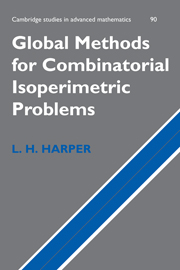Global Methods for Combinatorial Isoperimetric Problems
Certain constrained combinatorial optimization problems have a natural analogue in the continuous setting of the classical isoperimetric problem. The study of so called combinatorial isoperimetric problems exploits similarities between these two, seemingly disparate, settings. This text focuses on global methods. This means that morphisms, typically arising from symmetry or direct product decomposition, are employed to transform new problems into more restricted and easily solvable settings whilst preserving essential structure. This book is based on Professor Harper's many years' experience in teaching this subject and is ideal for graduate students entering the field. The author has increased the utility of the text for teaching by including worked examples, exercises and material about applications to computer science. Applied systematically, the global point of view can lead to surprising insights and results, and established researchers will find this to be a valuable reference work on an innovative method for problem solving.
- Global method leads to interesting new insights and results
- Text designed for graduate students with numerous exercises and examples
- Author gives applications to computer science to broaden market
Product details
December 2010Paperback
9780521183833
250 pages
229 × 152 × 14 mm
0.37kg
Available
Table of Contents
- 1. The edge-isoperimetric problem
- 2. The minimum path problem
- 3. Stabilization and compression
- 4. The vertex-isoperimetric problem
- 5. Stronger stabilization
- 6. Higher compression
- 7. Isoperimetric problems on infinite graphs
- 8. Isoperimetric problems on complexes
- 9. Morphisms for MWI problems
- 10. Passage to the limit
- 11. Afterword
- 12. The classical isoperimetric problem.






